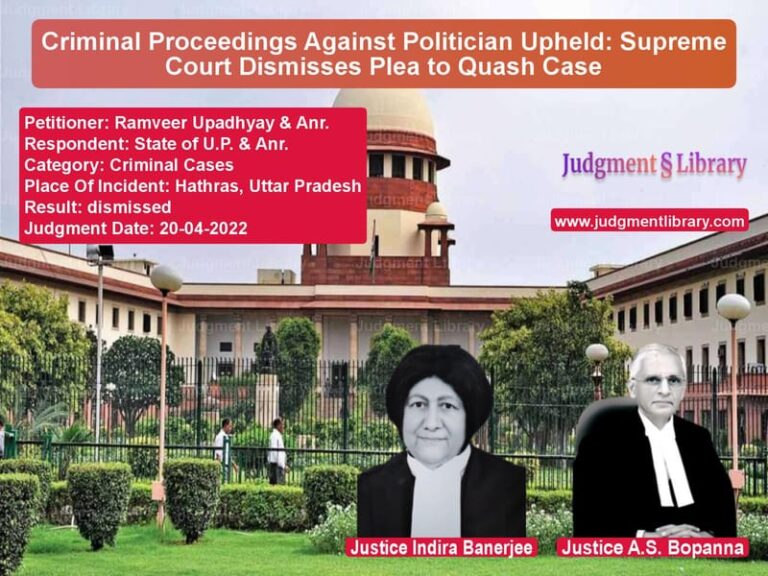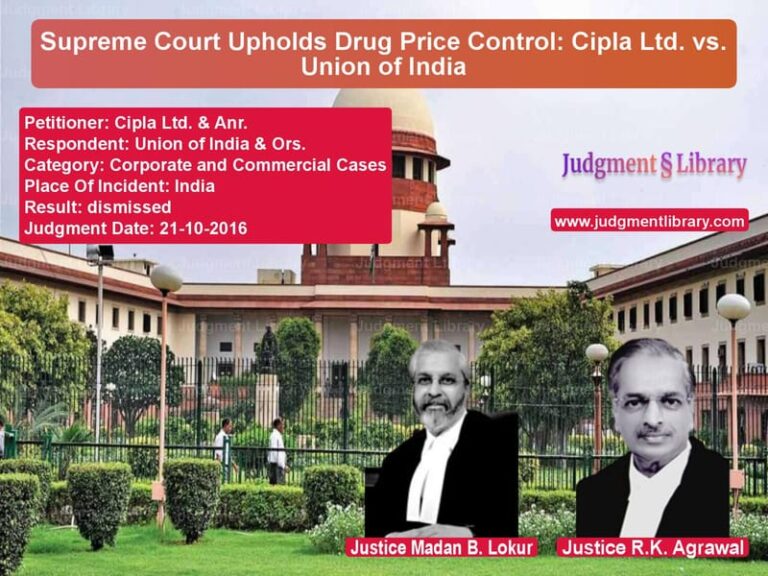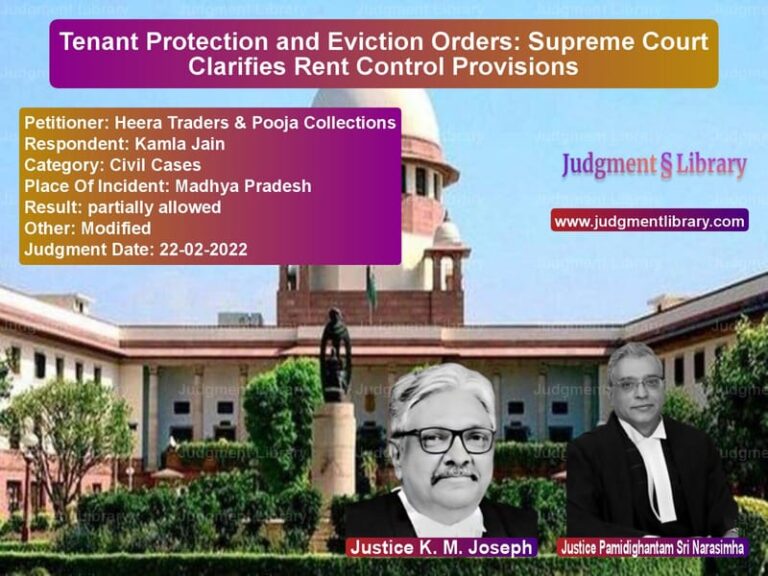Uniform Marriage Age: Supreme Court Transfers Petition for Judicial Review
The issue of uniformity in the minimum age of marriage for men and women has been a matter of intense debate in India. Various laws prescribe different legal ages for marriage, creating disparities that have long been questioned for their constitutional validity. The Supreme Court judgment in Ashwini Kumar Upadhyay & Anr. vs. Union of India & Others has once again brought this issue to the forefront of legal and public discourse. The petitioners sought the transfer of Writ Petition (C) No. 8905 of 2019 from the Delhi High Court and CW/13784/2019 from the Rajasthan High Court to the Supreme Court to ensure a uniform judicial review.
The petition was driven by concerns regarding the disparity in marriage laws, which set different minimum ages for men and women. The legal age of marriage in India varies across different religious and secular laws, with men generally required to be 21 years old, while women can marry at 18. The petitioners argued that this distinction is arbitrary and violates fundamental constitutional principles, particularly Articles 14 (right to equality) and 15 (prohibition of discrimination).
Background of the Case
India has a complex legal framework governing marriage, with multiple personal laws applicable to different religious communities. These laws prescribe different minimum marriage ages, leading to inconsistencies and gender-based discrimination. The petition sought to address this disparity by advocating for a uniform marriage age for both men and women.
Read also: https://judgmentlibrary.com/rti-and-collegium-decisions-supreme-courts-verdict-on-disclosure/
Initially, the case was being heard in the Delhi and Rajasthan High Courts. However, the Rajasthan High Court dismissed CW/13784/2019 due to lack of prosecution, leaving WP (C) No. 8905 of 2019 as the primary petition. The Supreme Court decided to transfer this petition to itself for final adjudication.
Petitioners’ Arguments
The petitioners, represented by senior counsel, put forth strong arguments in favor of a uniform marriage age:
- Violation of Constitutional Rights: The existing disparity in marriage age violates Articles 14 and 15 of the Constitution by creating an arbitrary distinction between men and women.
- Gender Discrimination: Setting a lower marriage age for women reinforces outdated gender roles and restricts their educational and career opportunities.
- Legal Precedents: The petitioners cited various judgments that emphasized gender equality and non-discrimination as fundamental principles.
- Impact on Women’s Rights: A lower marriage age for women increases the risk of early pregnancies, health complications, and economic dependence.
Respondents’ Arguments
The respondents, primarily represented by the Union of India, argued against judicial intervention on the following grounds:
- Legislative Domain: Marriage laws are primarily governed by legislation, and any change in the minimum age should be enacted by Parliament rather than imposed by the judiciary.
- Existing Legal Framework: The current framework accounts for social and cultural norms, and abrupt changes may disrupt established practices.
- Ongoing Discussions: The government is already considering reforms in personal laws, and judicial intervention at this stage may be premature.
Supreme Court’s Observations
The Supreme Court, comprising Chief Justice Dr. Dhananjaya Y Chandrachud and Justice Pamidighantam Sri Narasimha, acknowledged the significance of the issue. The Court noted:
“The issue which is raised in the main proceedings pertains to uniformity in the minimum age of marriage for men and women in diverse legislations.”
The Court recognized that the petition raised substantial constitutional questions that warranted careful examination. Given the implications for gender equality and legal uniformity, the Court found it appropriate to transfer the pending writ petition to itself.
Read also: https://judgmentlibrary.com/supreme-court-orders-review-of-fake-pharmacists-case-in-bihar/
Legal and Social Implications
The Supreme Court’s decision to hear the case has far-reaching implications. If the Court rules in favor of a uniform marriage age, it could lead to significant legal reforms across all religious communities. Such a ruling would promote gender equality and ensure that marriage laws align with contemporary societal values.
Furthermore, this case underscores the importance of legal uniformity in a diverse country like India. Inconsistencies in marriage laws have long been a source of legal disputes, and a Supreme Court ruling could provide much-needed clarity and consistency.
Future Course of Action
With the matter now before the Supreme Court, the next steps will involve detailed hearings and deliberations. The Court will examine the constitutional validity of existing laws and determine whether legislative intervention is required. The decision in this case will likely set a precedent for future legal and policy reforms related to marriage laws in India.
As the case progresses, it will be closely watched by legal experts, policymakers, and activists advocating for gender equality. The outcome will have significant implications for the legal landscape and the rights of individuals across the country.
Petitioner Name: Ashwini Kumar Upadhyay & Anr..Respondent Name: Union of India & Others.Judgment By: Justice Dhananjaya Y Chandrachud, Justice Pamidighantam Sri Narasimha.Place Of Incident: India.Judgment Date: 13-01-2023.
Don’t miss out on the full details! Download the complete judgment in PDF format below and gain valuable insights instantly!
Download Judgment: ashwini-kumar-upadhy-vs-union-of-india-&-oth-supreme-court-of-india-judgment-dated-13-01-2023.pdf
Directly Download Judgment: Directly download this Judgment
See all petitions in Fundamental Rights
See all petitions in Constitution Interpretation
See all petitions in Legislative Powers
See all petitions in Public Interest Litigation
See all petitions in Judgment by Dhananjaya Y Chandrachud
See all petitions in Judgment by P.S. Narasimha
See all petitions in allowed
See all petitions in supreme court of India judgments January 2023
See all petitions in 2023 judgments
See all posts in Constitutional Cases Category
See all allowed petitions in Constitutional Cases Category
See all Dismissed petitions in Constitutional Cases Category
See all partially allowed petitions in Constitutional Cases Category







